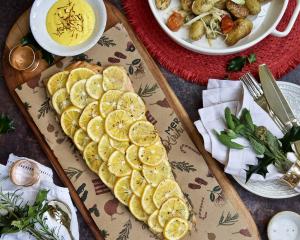
Do herbs lose their vitamins, minerals and bioactive compounds in the cooking process? Yes and no.
The type of cooking influences vitamin loss. Some vitamins, in particular vitamin C and the B group, to varying degrees are heat sensitive and will dissipate when exposed to heat, especially for a long time. In 19th-century America the pasteurisation of milk was blamed for a rise in infant scurvy, as the naturally occurring vitamin C in milk was destroyed by boiling the milk for a good 20 minutes.
Herbs high in vitamin C include raspberry leaf, red clover, rosehips, hops, elderberry and hawthorn. If you want to preserve the vitamin C, don’t boil them for a prolonged period. Blackcurrants have extremely high concentrations of vitamin C and I use the dried, powdered form in many of my herb mixes that do not require heating.
The water-soluble B vitamins are also lost when boiled — or rather, they leach into the water, which can be saved to make sauces and soups. Prolonged boiling, however, will see the vitamins lost altogether. Herbs that are high in B vitamins include alfalfa, gotu kola, hops and peppermint.
The fat-soluble vitamins (A, D, E and K), on the other hand, are unaffected by heat or water. In fact these vitamins are absorbed into the oil of stir-fries or salad dressings, which are then consumed. Herbs high in vitamin A include alfalfa, calendula, gotu kola, nettles and dandelion root.
Vitamin E is degraded by light and air. Many dried herbs and spices contain vitamin E (e.g. paprika, chilli, cinnamon, oregano and basil), which is one reason why they should be stored in airtight containers in the dark. Vitamin K is also affected by light. Herbs high in vitamin K include basil, coriander, marjoram, parsley, sage, thyme, basil and chives.
Vitamin C is sensitive to air, which is why vitamin C levels are often higher in frozen vegetables than fresh ones, which can degrade in storage. Vegetables frozen quickly after harvesting retain a good proportion of their nutrients.
Herbs do not contain vitamin D.
Most minerals in our diets are not affected by heat and the majority are in the form of water-soluble salts, which makes them ideal for herbal teas.
Lycopene, a potent antioxidant, is actually amplified by heat. Tomatoes are famous for their lycopene content, which becomes more easily absorbed by the body when cooked. Lycopene is also found in parsley, basil and rosehips. Lycopene is also fat soluble — consuming it with fat increases its bioavailability.
The main polyphenols (especially phenolic acids and flavonoids) of medicinal herbs are lost in water. Heat can also influence the polyphenol content, but sometimes for the better. A Sri Lankan study found that gotu kola contained more carotenoid than raw leaves after boiling and steaming, but less carotenoid after frying. Total antioxidant capacity, however, was almost equal in cooked and raw leaves. Conversely, passionfruit (Passiflora edulis) leaves showed lower flavonoid content after boiling and steaming compared with fresh leaves.
The overall message is that some herbs will lose or gain some polyphenol activity (those in the Lamiaceae family, such as parsley, rosemary, sage and thyme, being particularly susceptible), but whatever you do with them, you will still reap the benefits of the herbs’ nutrients and phytochemicals.











